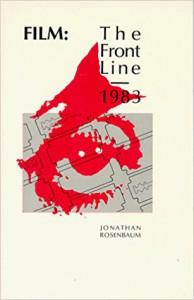From Film: The Front Line 1983 (Denver, CO: Arden Press, 1983). Due to the length of this, I’ll be posting it in four installments. — J.R.

Tenants of the house,
Thoughts of a dry brain in a dry season.
T.S. Eliot, Gerontion
Preface: When I was approached last year about inaugurating a series of volumes surveying recent avant-garde film, I immediately started to wonder about how this could be done. Having lived nearly eight years in Paris and London and about as long in New York, I’ve had several opportunities to note the relative degree of information flow between these and other centers of avant-garde film activity, and the growing isolation of New York from these other centers made my own fixed vantage point less than ideal in some ways. When a colleague told me that Jonas Mekas had recently said that it was no longer possible to know what was happening in experimental film as a whole, a bell of recognition rang in my head, and I knew at once that Mekas was the only available oracle l could turn to. The Lithuanian patron saint of the American avant-garde film, now 60, has been an American filmmaker for at least half of his life, and a chronicler of the avant-garde film in New York — mainly in The Village Voice and (more briefly) Soho News — for at least 15 years. Read more
From Film: The Front Line 1983 (Denver, CO: Arden Press, 1983). Due to the length of this, I’ll be posting it in four installments. — J.R.

Tenants of the house,
Thoughts of a dry brain in a dry season.
T.S. Eliot, Gerontion
Preface: When I was approached last year about inaugurating a series of volumes surveying recent avant-garde film, I immediately started to wonder about how this could be done. Having lived nearly eight years in Paris and London and about as long in New York, I’ve had several opportunities to note the relative degree of information flow between these and other centers of avant-garde film activity, and the growing isolation of New York from these other centers made my own fixed vantage point less than ideal in some ways. When a colleague told me that Jonas Mekas had recently said that it was no longer possible to know what was happening in experimental film as a whole, a bell of recognition rang in my head, and I knew at once that Mekas was the only available oracle l could turn to. The Lithuanian patron saint of the American avant-garde film, now 60, has been an American filmmaker for at least half of his life, and a chronicler of the avant-garde film in New York — mainly in The Village Voice and (more briefly) Soho News — for at least 15 years. Read more
From Film: The Front Line 1983 (Denver, CO: Arden Press, 1983). Due to the length of this, I’ll be posting it in four installments. — J.R.

Tenants of the house,
Thoughts of a dry brain in a dry season.
T.S. Eliot, Gerontion
Preface: When I was approached last year about inaugurating a series of volumes surveying recent avant-garde film, I immediately started to wonder about how this could be done. Having lived nearly eight years in Paris and London and about as long in New York, I’ve had several opportunities to note the relative degree of information flow between these and other centers of avant-garde film activity, and the growing isolation of New York from these other centers made my own fixed vantage point less than ideal in some ways. When a colleague told me that Jonas Mekas had recently said that it was no longer possible to know what was happening in experimental film as a whole, a bell of recognition rang in my head, and I knew at once that Mekas was the only available oracle l could turn to. The Lithuanian patron saint of the American avant-garde film, now 60, has been an American filmmaker for at least half of his life, and a chronicler of the avant-garde film in New York — mainly in The Village Voice and (more briefly) Soho News — for at least 15 years. Read more

